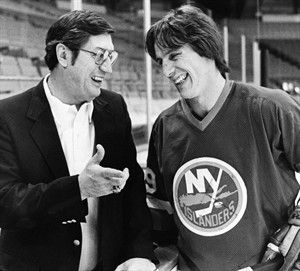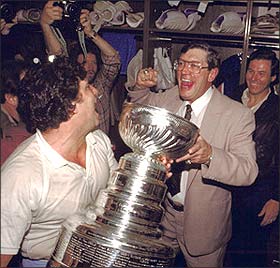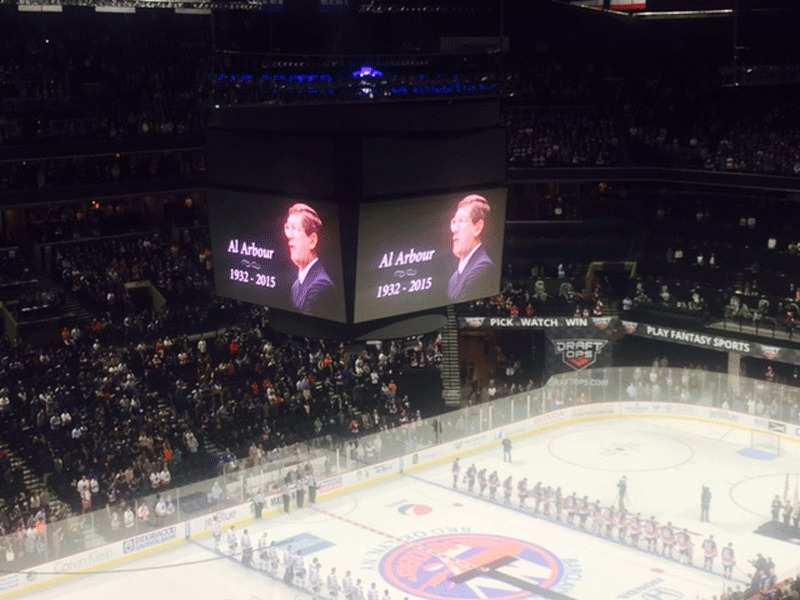Hawkey Town 18
Registered User
Pat Burns, Coach

NHL Head Coach: 13 Seasons (plus 8 games one other season)
NHL Regular Season Record: 501 – 353 – 151 – 14
NHL Playoff Record: 78-71
Stanley Cup Champion: 2003
Stanley Cup Final: 1989
Conference Final: 1993, 1994
Jack Adams Record: 1, 1, 1, 3, 4, 6, 8
*Only Coach to Win Jack Adams Trophy with 3 Different Teams (Montreal – 1989, Toronto – 1993, Boston – 1998)
HHOF.com
The London Free Press – Pat Burns was a winner wherever he coached – Nov 12, 2014
NHL.com – Long Overdue Hall Induction for Pat Burns – Nov 13, 2014
The Hockey Writers – Pat Burns Biography – Apr 16, 2018

NHL Head Coach: 13 Seasons (plus 8 games one other season)
NHL Regular Season Record: 501 – 353 – 151 – 14
NHL Playoff Record: 78-71
Stanley Cup Champion: 2003
Stanley Cup Final: 1989
Conference Final: 1993, 1994
Jack Adams Record: 1, 1, 1, 3, 4, 6, 8
*Only Coach to Win Jack Adams Trophy with 3 Different Teams (Montreal – 1989, Toronto – 1993, Boston – 1998)
HHOF.com
Prior to the 1987-88 season, Serge Savard, GM of the Montreal Canadiens, approached Pat about coaching Montreal's AHL franchise in Sherbrooke. After consulting with Gretzky, Burns accepted the offer. He spent the season in Sherbrooke and by the start of the next season, Jean Perron was fired in Montreal and Pat Burns hired as his replacement. "Six years before, I had bought scalper's tickets to watch the Canadiens play at the Forum," he recalled. "I sat in the blues and watched Bob Gainey, Larry Robinson, Bobby Smith and Mats Naslund. Six years later, I'm behind their bench!"
Dedicated to strong defensive play, the Canadiens finished the 1988-89 campaign with the fewest goals-against (218) and finished first in the Adams Division with 115 points. Pat took Montreal to the Stanley Cup final, only to fall to the Calgary Flames in six games. At the conclusion of the season, the rookie coach was named recipient of the Jack Adams Award as the NHL's coach of the year.
Burns and the Canadiens finished third in the Adams Division in 1989-90, second in 1990-91 and first in 1991-92, but in each spring, were eliminated in the second round of the playoffs at the hands of the Boston Bruins.
After resigning from the Canadiens, Burns considered an offer to coach the Los Angeles Kings, but was hired instead by the Toronto Maple Leafs in 1992-93. "I find myself fortunate to coach two of the greatest franchises in NHL history," he said at the time. Burns guided that franchise to some of its most glorious moments since last winning the Stanley Cup in 1967. The Leafs finished the 1992-93 season with 99 points, good for third place in the Norris Division, then went on a storybook run that took them deep into the playoffs, finally losing to Los Angeles in the third round. Burns, again, was awarded the Jack Adams Trophy for his skilled coaching. The next season, Toronto finished second in the Central Division, enjoying a 98-point campaign, and again went to the third round of the playoffs before their season ended.
The strike-shortened 1994-95 season saw the Maple Leafs finish fourth, and they were eliminated in the first round of the playoffs. Pat was relieved of his duties by the Leafs late in the 1995-96 season.
Hired by the Boston Bruins for the 1997-98 season, Burns led the team to a second-place finish in the Northeast Division. While the Bruins lost in the first round of the post-season, Pat was again selected as the NHL's coach of the year. His unprecedented third Jack Adams Award, all won in his first season with the team, sets Pat Burns apart from all other NHL coaches.
Burns and his Bruins finished third in their division in 1998-99, and Pat guided the team to the second round of the playoffs before they lost out. The next season, Boston slumped and missed the playoffs altogether. Eight games into the 2000-01 season, Pat was fired by the Bruins.
The New Jersey Devils hired Pat to coach the team in 2002-03, and he led the team to a 108-point first-place finish in the Atlantic Division, and with a hard-working team, finished that season as the Stanley Cup champions. In 2003-04, the Devils collected 100 points, good for second place in the Atlantic, but they were ousted in the first playoff round.
Health challenges concluded Pat's coaching career, but not before achieving outstanding success. His career record stands at 501 wins, 350 losses, 161 ties and 14 overtime losses in 1,019 regular season games over fourteen NHL seasons. A third battle with cancer finally ended Pat's life on November 19, 2010. The three-time Jack Adams Award winner will forever be regarded as one of the toughest competitors to stand behind an NHL bench.
The London Free Press – Pat Burns was a winner wherever he coached – Nov 12, 2014
“He believed in his players and his players believed in him,” said defenceman Todd Gill, who flourished under Burns.
“In 20 years, that was the closest group of guys I ever played with.”
…
But within a few years, Burns, Fletcher and Gilmour were all gone. Burns stayed in the Original Six family, hired by long-time rival Harry Sinden in Boston in 1997. He spent three years there and won his third Adams Trophy, taking a dead-last team to 90-point territory.
…
He brought out the best in the Devils’ championship pieces — superstar defenceman Scott Niedermayer, their grinder defence, Joe Nieuwendyk up front with Jersey’s trap-happy forwards and Martin Brodeur in net. Burns kept a low profile as the Devils fought through the spring of 2003, beating Boston, Tampa Bay, Ottawa (in seven) and, ultimately, Anaheim in the final.
Coached by Mike Babcock and mirroring the Devils’ style, the Ducks took the series to seven games. Showing his softer side, Burns took veteran defenceman Ken Daneyko out of the press box for the deciding match at the Meadowlands. Daneyko was told at a team meal prior to Game 7 and excused himself to go and cry. When the game ended and his turn to hoist the Cup came, Burns gestured to where his family and friends were gathered.
“I was out of the game two years and read a lot of articles saying that I was done,” he said. “I wasn’t.”
NHL.com – Long Overdue Hall Induction for Pat Burns – Nov 13, 2014
The Leafs had not posted a winning record in a dozen years leading to Burns’ 1992 hiring and had won just two playoff series in that period. In his first two years with the team, Burns took teams built around Doug Gilmour, Wendel Clark and Felix Potvin to the third round of the playoffs and helped re-establish the lustre of the Leafs logo.
…
Cliff Fletcher. Maple Leafs GM from 1991-1997
“The good thing about Pat when he took over, every player was accountable and that went from Doug Gilmour on down. He installed that in the team, that pride in the logo, pride in the team. He insisted on a work ethic that was second to none in the league. Every practice, every game, every shift had to give the maximum effort or you had a very hard time staying on a Pat Burns team.
Some of Pat’s persona was theatrical. He had a little bit of that from being a cop but let’s face it successful coaches in all sports have that. But Pat gravitated to his star players like Wendel and Doug Gilmour, Felix Potvin and Dave Ellett. They were involved in a lot of decisions with him which was unusual at that time. That’s how Pat ran his team. The result of that was all the top players bought into his philosophy and led the way in practice and during the games. That’s why he was able to have the success he did. He was tough on his best players but it was tough love.
That doesn’t mean Pat treated every player the same way. The players on the bottom end of the lineup, they were the whipping boys. When we had Billy Berg, Peter Zezel and Mark Osborne playing on the checking line, those were the two most successful lines we had.”
The checker: Bill Berg. Maple Leafs winger from-1993-1996.
“Without a doubt he was the most demanding coach I ever played for. The big thing with Pat was fitting people into roles. He felt his role was the taskmaster. He was the guy who would call you out when you were not paying up to par.
The one thing I don’t ever hear too much about Burnsie is how fabulous a teacher he was. Back then not many teams played the trap and forechecked a certain way. With Burnsie it was detail, detail, detail. He taught. It was incredible. In that first meeting he said: “this is what is going to happen. We play different than any other team in the league. It is going to take you a little while to get used to the system, eventually what will happen is that it will just be second nature to you. He was exactly right. Once we all caught on we just caught fire.
…
Sometimes he’d take you into the office and scream at you there. Other times he would let you know he wanted a certain thing. It wasn’t all cracking the whip. Sometimes he knew you could do better and he would put you out there.”
The star: Wendel Clark, Maple Leaf, 1986-1994, 1996-98, 2000.
“Burnsie had a way of pushing buttons and getting everyone to play his style. He was a tough guy about it. There was no nonsense.
“He wanted to be the leader of the ship. He wanted full control about what was going on off the ice and on. He wanted the full package. Practices were hard right from the first day through playoffs.
Most of the team played a trap style but it really depended on what was happening on the ice. You played with Dougie, you had a little more leeway.
…
He set the game plan and played all year to get us that way. Every player on the roster accepted his or her role to do it. That’s the toughest thing, to get every player to buy into their role for the greater good no matter what that role is. He got all the guys to do that.
He had the tough cop routine, he kicked trash cans and water coolers but Pat also was great at coming up with a game plan. He knew how to run a game and he knew what he needed to do to help his team find a way to win.”
The Hockey Writers – Pat Burns Biography – Apr 16, 2018
Patrik Elias:
“Honestly, my time with him (as Devils coach) was probably my toughest time during my career with a coach. He was really hard on me, and I don’t think we had a good understanding with each other until probably the second year he was here. Then we found out what was happening with him (health-wise) and we started having a better relationship on the ice and off the ice. For most of the time before that it was really tough, we didn’t really see eye-to-eye on many things. I respected him and I still do; I look at it like it was a good experience, something to learn from. You have hurdles throughout your life and career and you just deal with it like a man.
I will always remember him from our championship team in 2003 though; never forget that. It shows me that there is more than one way to win the Stanley Cup: in 2000 we did it playing unbelievable hockey — offensively, defensively, great players. In 2003 we didn’t have as talented a team, but everybody clicked at the right time; different guys stepped up and performed or had an impact every night. That’s a testament to his coaching and influence on us.”
Martin Brodeur:
“Pat was a fun coach (for me), he made the game fun and he had a pretty good system. He’s the type of guy that demanded respect, he was an old cop; you could tell with his attitude — he could be really, really tough with you but when you talk to him on the side he was really, really nice. I got to know him really well when we won the Stanley Cup. Our families became friends and we rode motorcycles together, did a lot of different things.
It definitely was sad to see the end for him, the way it happened. He was a guy that really loved living and it was an unfortunate thing. As far as professionally, he was (always) getting the best out of the players.”
Brian Gionta:
“He’s one of the best coaches I’ve ever had; he gave me a great start in this league and I’m forever grateful for that. He’s just an honest coach that rewards you when you are doing the right things and playing the right way. Obviously he was our coach when we won the Stanley Cup in 2003, so I have great memories of him and we stayed in touch right until the end.”
Grant Marshall:
“For me, Pat was one of my favorite coaches that I’ve ever had. I think because of his personality, he fit with the style of player I think I was; which was not really flashy, it was I guess in your face, passionate and team oriented. A couple of great attributes Pat had were — he wasn’t shy; he was real. He spoke from the heart, told it like it was and the other thing was that he wasn’t afraid to give you crap – but at the same time he wasn’t afraid to tap you on the back and say ‘great job’. I think that’s a key attribute that a coach should have and the players should realize you’re going to get crap sometimes but also it’s okay that you’re going to get some praise as well; it goes hand-in-hand.”
Some coaches will say ‘play hard, play hard, that’s all that matters’, some coaches say that and I don’t think it holds true; I hope it does. But with him it is true, he really recognized that he doesn’t care too much about skill, all he cares about is winning and how you do that. If you’re a hitter, you hit; if you’re a goal scorer, then you try to score. But the most important thing is you have to work hard and play for the guy next to you. That was he was really, really adamant and preached about.”[/quote]





